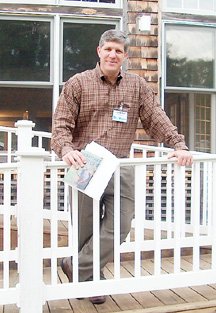
Volume XVII, Issue 43 ~ October 22 - October 28, 2009
Home \\ Correspondence \\ from the Editor \\ Submit a Letter \\ Classifieds \\ Contact Us
Dining Guide \\ Home & Garden Guide \\ Archives \\ Distribution Locations \\ Advertising
![]()

Still Fighting for the Bay
In his latest book, political scientist and Bay advocate
Howard Ernst urges eco-warriors to take off their gloves

a Bay Weekly exclusive
Six years ago, Howard Ernst’s Chesapeake Bay Blues exploded illusions surrounding that shop-worn phrase “restoring Chesapeake Bay.”
One illusion: Pumping money toward research absent dramatic action will one day heal the ailing Bay.
Another: Politicians can be considered Bay-friendly even as they balance interests and avoid a reckoning with Bay health.
One more illusion: Environmental advocates who choose partnerships and persuasion rather than confrontation can prevail.
Ernst took no prisoners on this score and left bruised egos in his wake.
Now Ernst is back with a new book, called Fight for the Bay, striking out in some new directions while sharpening important insights that have turned out to be true.
Since his first book, the Government Accountability Office tabulated the depressing reality that some $7 billion has been plowed into Bay recovery with more failure than success. Players in the multi-state compact in charge of the Chesapeake Bay Program have admitted their shortcomings and promised new resolve.
Meanwhile, the Chesapeake Bay Foundation, the well-heeled educational organization that absorbed some of Ernst’s barbs, has gotten more aggressive and turned loose its legal beagles.
That leaves the underlying political problem of fixing the Bay, which Ernst illuminates brilliantly in his new book. Even so, readers might have hoped that smart-guy Ernst would go beyond spelling out what’s wrong and offer some pointers on navigating today’s tricky environmental politics.
Shades of Green
Ernst, a political science professor at the U.S. Naval Academy in Annapolis, bores in deeply on Light Green and Dark Green advocates, enough to give readers a sense of the camp to which they belong. The Light Greens, as Ernst describes them, are the folks who accept responsibility to care for the environment much like gardeners tend their plots.
He quotes Tom Horton, the Bay-champion journalist: “They are like a good suburban pastor, who will give you an uplifting sermon, but who will not challenge the way you live or ask you to give money to the poor.”
Then there are Dark Greens, folks who view the spoiling of nature as nothing short of the degradation of humankind. To them, a clean and healthy environment is a right, not just a responsibility. They view words like partnership and stakeholder as jargony obstacles to the task of confronting the powerful forces that would destroy the world of the Chesapeake.
Toothless Watchdogs and Citizen Heroes
Ernst plows new ground in tackling a fact many Americans haven’t yet realized: The decline of newspaper investigative reporting will affect their lives, their well-being and their environment. Who will tell the people, he asks? Good question.
By now we know the familiar tale playing out across the country of daily newspapers blasted by a perfect storm of recession and changing reader habits. People see it in shrunken news holes and diminished enterprise in their newspaper — if they’re not too busy Googling and Twittering.
What the new Internet minions haven’t yet acknowledged is the certainty that more polluters and scoundrels will roam the land when newspapers abandon their watchdog role. Many may be content with infotainment and blogs that reinforce their biases. But will a 140-character Tweet ever bring down a Bay polluter?
Ernst tips his hat to citizen activists taking up the slack by turning over a chunk of his book for them to tell their stories. Tyla Matteson tells her tale of rescuing the Mattaponi River in Virginia. Mike Shay of South Arundel Citizens for Responsible Development deployed a giant puppet to capture media attention in a successful drive to prevent a big-box grocery near the Bay.
Cold Out There
The book is short (just over 100 pages of text), and that’s unfortunate given the scope of the problem Ernst breaks down — and new political challenges taking shape.
He’s correct in saying that with climate change and other problems looming, there’s much to be learned from efforts to bring back Chesapeake Bay. But redemption looks to be getting tougher. In recent months, the environmental debate has become even more polarized as Congress edges toward confronting climate change.
These days, even the Light Greens might find themselves labeled eco-terrorists. And politicians seeking the right conservation path for Chesapeake Bay are encountering new obstacles.
Ernst writes of the value of cash and endorsements at election time. He’s right, but it’s more than that. A new era of diminished pots of money, other priorities and anti-environmentalism demands a new brand of politics. Pro-environment warriors, no matter their shade of green, likely will need a new resolve and a new message that reminds people why Chesapeake Bay is worth fighting for.
Fight for the Bay: Available on-line this week and on the shelves by early November. Track Ernst’s signings at www.howardernst.com.
© COPYRIGHT 2009 by New Bay Enterprises, Inc. All rights reserved.